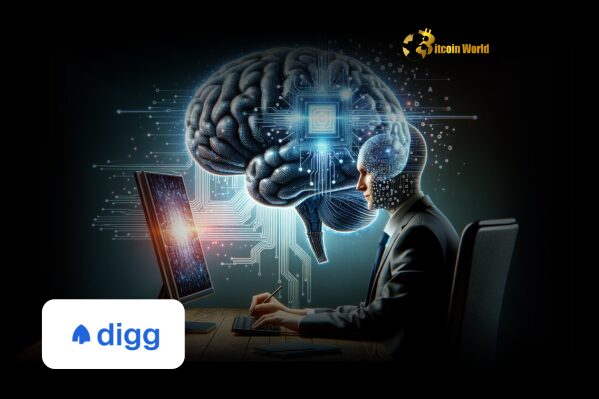BitcoinWorld

Digg Reboot: A Brave Stand for Human Content in the AI Era
In a digital landscape increasingly dominated by automated systems and generated text, the challenge of finding authentic online interaction is growing. For those in the cryptocurrency and blockchain space, where community and verified identity can be paramount, the rise of AI bots diluting online spaces is a significant concern. Against this backdrop, a familiar name is making a comeback: Digg. The original founder, Kevin Rose, is teaming up with Reddit co-founder Alexis Ohanian to relaunch the social news aggregation site with a clear mission: building a site for humans in the AI era.
Facing the Challenge of the AI Era
The internet is changing rapidly. What was once a space primarily driven by human interaction and creator-led content is now facing an influx of AI-generated material and sophisticated bots. This shift threatens to drown out genuine voices, making it harder to discover meaningful information and connect with real people. This is the core problem the new Digg aims to address, positioning itself as a platform dedicated to preserving human content.
Why a Digg Reboot Now?
Digg was a powerhouse in the Web 2.0 era, known for its community-driven approach to content discovery. Valued at $175 million at its peak, its decline left a void. Now, Rose and Ohanian see an opportunity to revive that spirit, but with lessons learned from the evolution of social media and the new challenges presented by artificial intelligence. Their vision for the Digg reboot focuses on enabling authentic discovery and fostering strong communities, reminiscent of the early internet’s promise.
Speaking at The Wall Street Journal’s Future of Everything conference, the founders shared their perspective. Alexis Ohanian reflected on past challenges in social media, including difficult decisions around content moderation and hate speech that impacted platforms and society. His subsequent work building ‘values-aligned’ businesses through his venture capital firm, Seven Seven Six, informs his approach to Digg. Kevin Rose added that early machine learning systems sometimes inadvertently amplified fringe content, a problem now compounded by bots and AI pushing specific agendas. Both agree that a new approach is needed to serve real people, not just automated systems.
Prioritizing Human Connection and Content
A central theme for the new Digg is combating the ‘dead internet theory’ – the idea that much of online content is not human-created. While once a fringe concept, the founders believe the rapid advancement of AI makes this a tangible reality today. They argue that a vast amount of social media content, even if posted by humans, is generated or heavily augmented by AI at scale, often with manipulative intent.
To counter this, the Digg reboot is exploring innovative technological solutions. One promising area is the use of zk proofs (zero-knowledge proofs), a cryptographic protocol that could potentially verify ownership or identity on the platform without revealing sensitive personal information. This technology, familiar to many in the blockchain space, could allow communities to set requirements for proving humanity before participation.
Other potential methods discussed include:
- Weighing user contributions based on device ownership history.
- Implementing tiered levels of service or interaction based on identity verification confidence.
- Requesting additional verification steps (like phone numbers or small fees for disposable contacts) for suspicious activity like rapid typing or anonymous sign-ups using VPNs or throw-away emails.
The goal is to create a user experience where authentic human connection is prioritized and easily distinguishable from automated noise.
Empowering Creators and Moderators
Beyond identity verification, the Digg reboot aims to address another critical issue in social media: the compensation of community builders. Kevin Rose strongly believes the model of unpaid moderation, where dedicated users build and manage massive communities without financial reward, is unsustainable and unfair. He advocates for a system where moderators and creators who invest their time and effort into the platform’s success are financially compensated or given a stake.
Rose contrasted this with instances where platforms have claimed ownership over community names or assets created by users, citing Reddit’s trademarking of ‘WallStreetBets’ as an example of what he wants to avoid. The new Digg seeks a model that aligns the incentives of the platform, its users, creators, and moderators, ensuring everyone benefits from the health and growth of the community.
Alexis Ohanian echoed this sentiment, stating his belief that a successful business model for Digg must align all stakeholders. This approach, combining a focus on authentic human content and community with a system that rewards contributions, is central to their strategy for making the Digg reboot thrive in the current digital climate.
Conclusion: A Human-First Future?
The reboot of Digg by Kevin Rose and Alexis Ohanian represents a significant effort to push back against the tide of AI-generated content and bots that threaten to make large parts of the internet feel less human. By focusing on identity verification through potential technologies like zk proofs and creating a model that compensates the vital work of creators and moderators, they hope to build a platform where authentic discovery and genuine human connection can flourish. Whether the AI era truly allows for a return to a more human-centric web remains to be seen, but Digg’s renewed mission offers a compelling vision for the future of online communities.
To learn more about the latest AI news trends, explore our article on key developments shaping AI features.
This post Digg Reboot: A Brave Stand for Human Content in the AI Era first appeared on BitcoinWorld and is written by Editorial Team





